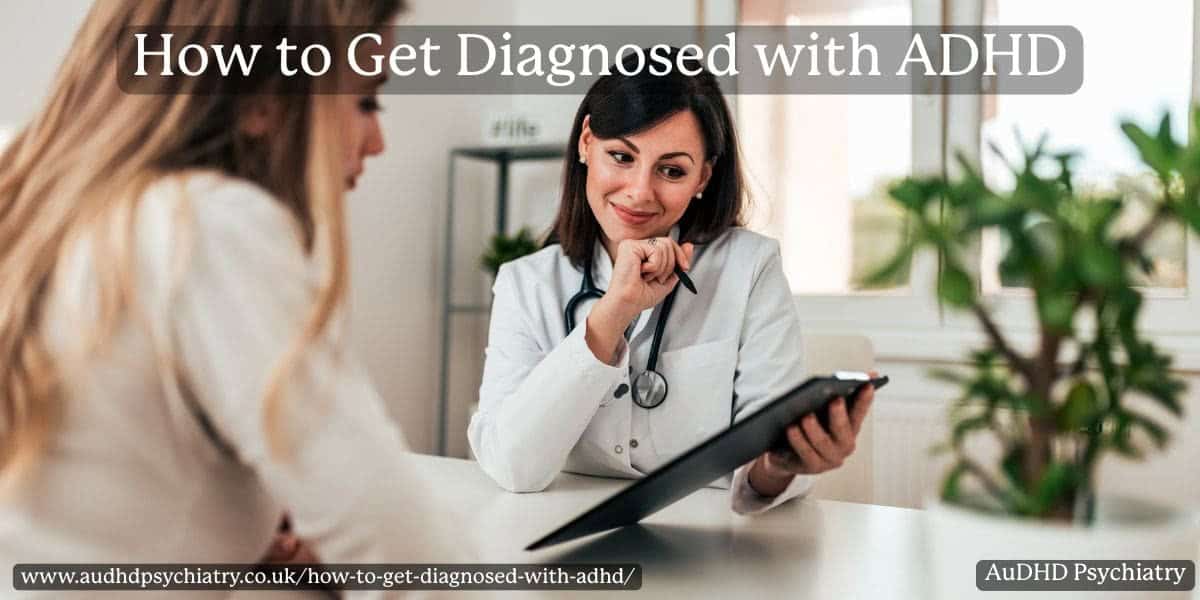
Table of Contents
- Understanding ADHD
- Steps to Getting an ADHD Diagnosis
- What to Expect at an ADHD Assessment
- ADHD Diagnosis Timeline and Cost in the UK
- NHS ADHD Assessment Options
- Private ADHD Assessment in the UK
- After an ADHD Diagnosis, What Happens Next?
- FAQs
- How to Get Diagnosed with ADHD: Conclusion
In Focus
- ADHD is a neurodevelopmental condition that can affect focus, impulsivity, and daily functioning.
- Online screening tools can flag symptoms, but they can’t confirm an ADHD diagnosis.
- In the UK, diagnosis starts with a GP referral or a private assessment with a specialist.
- NHS pathways can involve long waits, while private assessments are typically faster.
- A formal ADHD assessment can unlock treatment, support, and workplace or school adjustments.
Many people live with undiagnosed ADHD for years. These individuals may have been struggling with focus, memory, or impulsive behaviour without knowing why. If you’ve ever wondered whether you have ADHD, the first step is understanding the symptoms and how to get a formal diagnosis.
Getting an ADHD diagnosis can lead to life-changing support, whether you’re an adult juggling work and relationships or a young person facing challenges at school. In the UK, the process involves speaking with a healthcare professional, undergoing an ADHD assessment, and meeting specific diagnostic criteria.
Courtesy of our Edinburgh private ADHD clinic, this guide walks you through how to get diagnosed with ADHD in the UK, what to expect during the process, and where to find help. You’ll learn the key symptoms to look out for, your options through the NHS or private providers, and how to access effective treatment and support. If ADHD is affecting your daily life, getting a clear diagnosis is the most important step forward.
Understanding ADHD
ADHD, or attention deficit hyperactivity disorder, is a neurodevelopmental condition that can affect children and adults. It can interfere with focus, impulse control, time management, and emotional regulation, which are key functions needed for daily life. Understanding how ADHD presents across age groups is a crucial first step in recognising whether you or a family member may need a formal ADHD assessment.
ADHD in Adults
In adults, ADHD symptoms often show up as poor time management, forgetfulness, low frustration tolerance, and impulsive behaviour. Rather than being hyperactive, adults may feel chronically restless or overwhelmed. These challenges can affect work performance, strain relationships, and contribute to other mental health conditions such as anxiety disorders or depression.
Many adults with ADHD were never diagnosed in childhood and only begin to seek help after years of struggling with daily responsibilities.
ADHD in Children and Young People
Children and young people may display more obvious signs of hyperactivity, such as fidgeting, climbing, or difficulty sitting still. Inattentive symptoms like forgetfulness, daydreaming, or making careless mistakes at school are also common. These behaviours often affect academic performance and social skills, which can lead to frustration or low self-esteem if left unaddressed. Early childhood signs are sometimes mistaken for immaturity or disobedience rather than part of a developmental disorder.
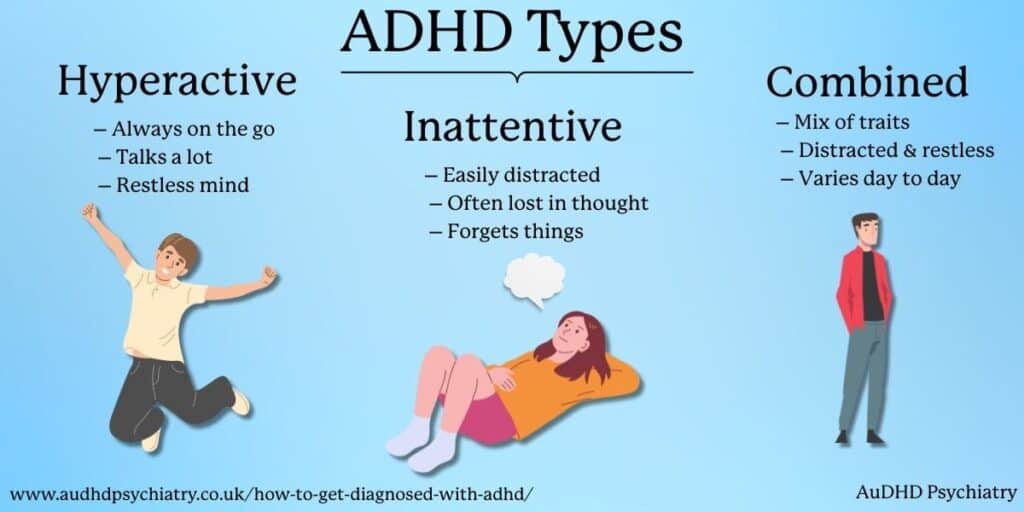
Observing Symptoms of ADHD Before Getting a Diagnosis
ADHD diagnosis focuses on persistent patterns over time, not one bad week, so clinicians look at how symptoms show up across settings (work, school, home) and whether they’ve been present since childhood. Core ADHD symptoms fall into three categories: inattentive, hyperactive-impulsive, or combined type. While hyperactivity may be more visible in younger children, inattentive ADHD is often harder to spot, especially in girls. Many families overlook these signs, assuming they’re just personality traits or behavioural problems.
Write down real-life examples (missed deadlines, repeated forgetfulness, time blindness, emotional overwhelm) and note how often they happen. Try to include examples from at least two settings, such as work and home, because multi-setting impairment is a key part of getting a diagnosis for ADHD. Additionally, online ADHD screening tools like the ASRS (Adult ADHD Self-Report Scale) or the SNAP-IV for children can help identify patterns, but are not a replacement for a professional ADHD evaluation. If you’re interested, take our free ADHD test and receive insights with possible next steps you might want to take.
What Causes ADHD?
The exact cause of ADHD is still under study, but genetics, brain structure differences, and environmental factors are key influences. A family history of ADHD increases risk, and some evidence links premature birth or low birth weight to a higher likelihood of diagnosis. Some studies also suggest that exposure to toxins or complications during pregnancy may play a role.
ADHD and Mental Health
ADHD rarely exists in isolation. It often overlaps with different mental health conditions, which may include depression, anxiety, mood disorders, or substance use disorders. These comorbid conditions can mask or mimic ADHD symptoms, making diagnosis more difficult.
For instance, someone with untreated ADHD may develop anxiety due to repeated failures or overwhelm in day-to-day life. Understanding these overlaps is essential for accurate diagnosis and effective treatment planning.
Steps to Getting an ADHD Diagnosis
The process of getting an ADHD diagnosis in the UK starts with recognising that the challenges you’re experiencing might stem from something deeper than disorganisation or stress. Whether it’s struggling with executive function, impulsive behaviour, or attention issues, the first step is deciding to seek help and understanding the ADHD diagnosis journey.
Where to Start
As we’ve mentioned, you can begin by tracking your symptoms over time. Are they persistent, affecting your daily life, and present in multiple areas like work, home, or school? Adults often notice patterns related to forgetfulness, poor time management, or restlessness. This preparation helps your GP understand why you’re requesting an ADHD referral rather than support for stress alone.
Parents might observe signs in a young person’s behaviour, like trouble focusing or emotional outbursts. Once you’ve gathered examples, the next move is to speak with a healthcare provider such as your GP, or consider booking a professional ADHD assessment service.

Who Can Assess ADHD in the UK?
Several medical professionals are qualified to assess ADHD: GPs, psychiatrists, clinical psychologists, and ADHD specialists. In most cases, your immediate care provider will act as your first point of contact. From there, they can refer you to an ADHD service, whether through the NHS or privately.
What Happens During the Initial GP Visit?
Expect your GP to ask about your medical history, current difficulties, and how symptoms impact your day-to-day life. Bring specific examples and, if possible, input from family members, teachers, or colleagues. GPs use guidance from the American Psychiatric Association’s Diagnostic and Statistical Manual of Mental Disorders (Fifth Edition) (DSM-5) and may offer rating scales to help determine whether a referral is appropriate.
Referral Options
If your GP agrees further assessment is needed, they will refer you to an NHS mental health professional or offer information about private ADHD assessment routes. If they do not refer you, you can request a second opinion or explore Right to Choose options, which allow patients more control over their ADHD diagnosis pathway.
Do you prefer to self-refer without contacting your GP? No need to worry. At AuDHD Psychiatry, we offer private ADHD assessments without the need for a GP referral. Just book a call with us, and we’ll be happy to guide you all throughout your ADHD diagnostic process.
What to Expect at an ADHD Assessment
If you’ve been referred or have chosen a private provider, the next step is the ADHD assessment itself. This process is structured to determine whether your symptoms meet the formal criteria for an ADHD diagnosis. While it may feel daunting, having a clear idea of what you can expect may help you prepare and feel more at ease throughout the experience.
What Happens During an Assessment
An ADHD assessment usually includes a clinical interview, psychological tests, and standardised rating scales. You may be asked to describe your symptoms, give examples of how they affect your daily life, and share details about your medical history, education, and relationships.
For children, information from parents, carers, and school staff is often included. Some providers may also request school records or third-party observations. The aim is to construct a comprehensive picture across different settings. Some providers may also recommend additional assessments, such as a private autism diagnosis for adults, if overlapping neurodevelopmental traits are suspected.
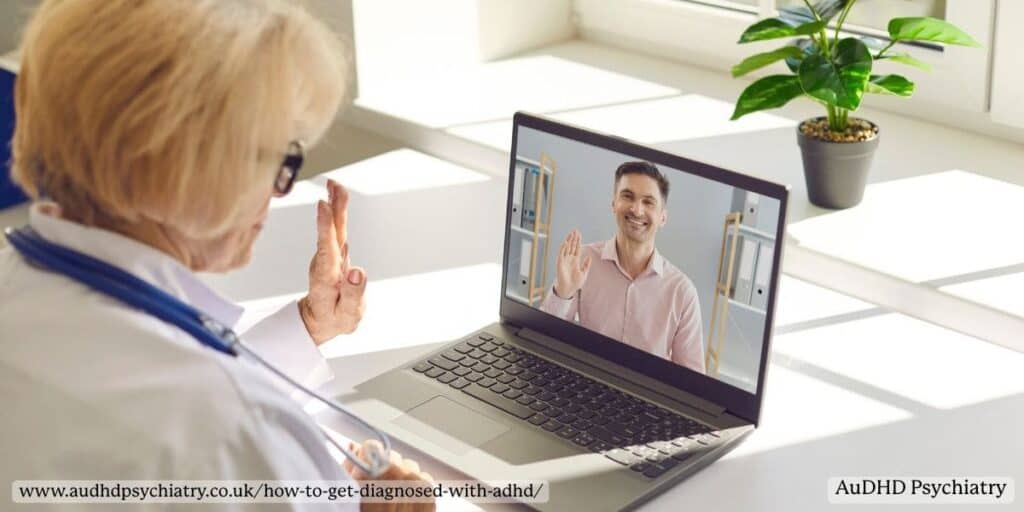
Assessments may be done in person or via telehealth, depending on your provider. You’ll likely be asked about your development, any past mental health conditions, and family history of neurodevelopmental conditions like ADHD or autism spectrum disorder.
At AuDHD Psychiatry, we offer online sessions you can book at a time and date that is convenient for you. We also open schedules for evenings and weekends.
Diagnostic Criteria: What Clinicians Look For
ADHD is diagnosed based on the DSM-5. This outlines symptoms of inattentive, hyperactive-impulsive, or combined types. For adults, at least five symptoms must be present, while children need six or more. The symptoms must have started in early childhood, typically before the age of 12, and must cause significant disruption in at least two areas of life, such as school, work, or home.
Clinicians will also rule out other medical conditions, such as sleep disorders, mood disorders, or learning disabilities, that could explain the symptoms. They may explore whether other mental health issues, such as substance use disorders, are also present.
Why Diagnosis Can Be Challenging
Diagnosing adult ADHD can be particularly complex. Adults may have developed coping strategies or masked their symptoms. Memory bias can affect how past behaviours are recalled, and comorbid conditions may blur the clinical picture.
Despite these challenges, a detailed and structured assessment by a qualified medical professional provides a more accurate diagnosis, and this is exactly what we commit to providing.
ADHD Diagnosis Timeline and Cost in the UK
Once you decide to pursue an ADHD diagnosis, one of the most common questions is: “How long will this take, and how much will it cost?” The answer depends on which ADHD assessment route you choose, either through the NHS or private providers, and each comes with different waiting times, fees, and availability.
NHS ADHD Diagnosis Timeline
The NHS offers free ADHD assessments, but waiting times can be long. In many areas of the UK, patients wait 12 to 24 months or more from referral to assessment. Demand for services has risen sharply, especially for adult ADHD, and this has created significant backlogs. Some regions may have shorter waitlists, but this varies widely.
Children are often prioritised for faster access, but delays are still common. If you’re referred through the NHS, your GP will send your details to the local ADHD service or child and adolescent mental health service (CAMHS). Then, you’ll be placed on a waiting list and contacted when an assessment becomes available.
To speed up the process, many patients now use the NHS Right to Choose pathway, which allows them to select another NHS-commissioned provider with shorter waiting times. You remain under NHS care, but can potentially access diagnosis and treatment more quickly.
Private ADHD Diagnosis Cost and Timeframe
Private ADHD assessments are available across the UK and are typically much faster. Our private clinic offers appointments within a week. This option appeals to those who are struggling now and can’t afford to wait years for support.
Costs vary depending on the clinic and provider. In general, a full ADHD assessment costs between £700 and £1,500. This includes the initial consultation, diagnostic interview, and detailed report. Follow-up appointments and medication reviews are often charged separately.
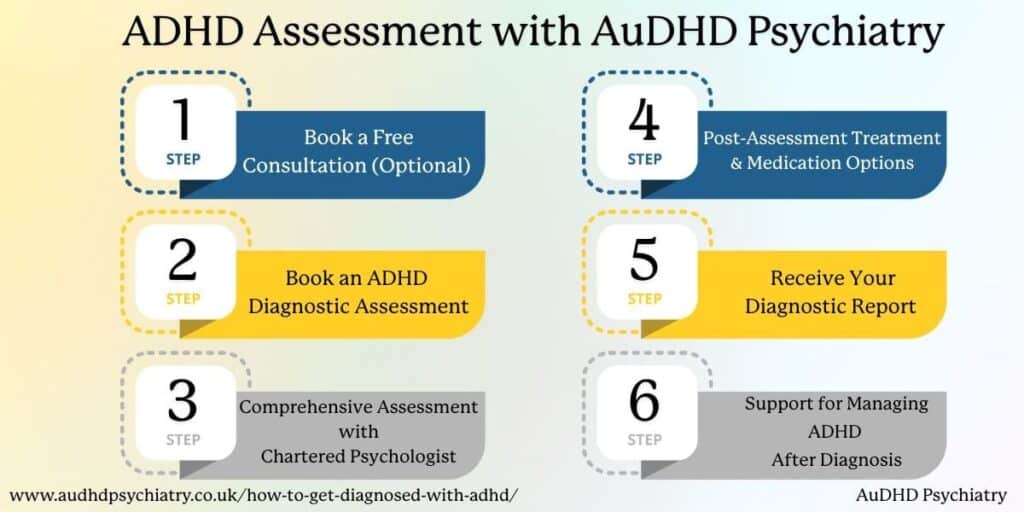
At AuDHD Psychiatry, we provide fast and accessible private ADHD assessments for adults and young people, with flexible appointment times and no need for a GP referral. If you’re looking to get started sooner and want to learn about our payment options, please visit our pricing page.
NHS ADHD Assessment Options
If you’re considering an ADHD diagnosis in the UK, the NHS provides a structured but often delayed route to assessment and treatment. While the process is free, it typically involves several steps, and these can take months or even years to complete.
Understanding how the system works can help you decide whether this route is right for you.
Standard NHS Referral Pathway
The first step is speaking to your GP. If they agree that your symptoms suggest ADHD, they can refer you to a local NHS mental health team or a child and adolescent mental health service (CAMHS) for younger patients. This referral must include enough information about your difficulties in daily life, such as issues with attention, emotional regulation, or hyperactivity. The more detail you can provide, the better.
Steps After GP Referral
Once referred, you’ll be added to the NHS waiting list for an ADHD assessment. In many parts of the UK, waiting times range from 12 months to over 2 years. While some local services aim to prioritise children, adult ADHD referrals can take significantly longer due to higher demand and limited resources.
During this time, it can be helpful to keep a journal of your symptoms, collect school or work reports, and speak to people who have observed your behaviour over time. These records may be useful when your assessment begins.
Right to Choose: A Faster NHS Option
If you live in England and your GP agrees to refer you for ADHD assessment, you have a legal right to select your alternative provider under the NHS Right to Choose scheme. This allows you to access NHS-funded services from other approved providers who may offer shorter waiting times.
To use this option, you must:
- Be registered with a GP in England
- Be referred by your GP for ADHD assessment
- Select a provider that offers services under Right to Choose (e.g. Psychiatry UK, Clinical Partners)
This route allows you to remain within the NHS system while reducing delays. It’s important to note that Right to Choose does not apply in Wales, Scotland, or Northern Ireland, where different rules and referral systems are in place.
If you’re unsure whether your GP supports this option, you can ask them directly. You are entitled to request it under NHS policy, and many GPs are familiar with the process.
NHS ADHD Assessment Summary
The NHS offers a valid and cost-free route to ADHD diagnosis, but long waiting times can be a barrier. Using Right to Choose may significantly shorten your wait while keeping the assessment free. If you are seeking a quicker alternative or need more flexibility in scheduling, a private ADHD assessment may be worth exploring alongside NHS options.
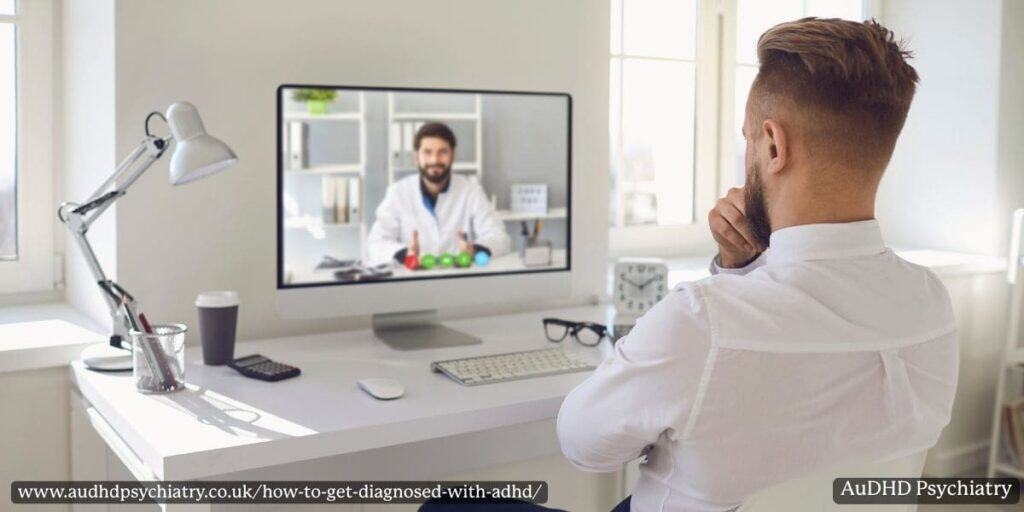
Private ADHD Assessment in the UK
If you’re searching ‘private ADHD diagnosis near me’, look for a provider that uses recognised diagnostic criteria (DSM-5/ICD), offers a clear written report, and explains medication follow-up or shared care options. For many people, long NHS wait times can delay access to crucial support. A private ADHD assessment offers an alternative route with faster timelines, flexible scheduling, and often more personalised care. If you’re seeking clarity without the extended wait, this option may be ideal.
What Makes Private ADHD Assessment Different?
Unlike NHS services, private assessments allow you to choose your provider, book directly, and often begin the process within days or weeks. There’s no need to go through your GP or wait for a referral. Most private clinics also offer remote sessions, making the process more accessible regardless of your location.
Key features of private ADHD assessments include:
- Shorter wait times – some providers offer appointments within a week
- Flexible appointments – including evenings or weekends
- Online options – remote assessments via secure video calls
- Detailed diagnostic reports – often suitable for schools, workplaces, or access to support plans
At AuDHD Psychiatry, we aim to make this journey as smooth and supportive as possible. Whether you’re seeking an adult ADHD diagnosis or need help for a young person, our assessments are designed to meet your individual needs.
What’s Included in a Private ADHD Assessment?
A comprehensive private ADHD assessment typically involves:
- A full clinical interview with a qualified specialist
- Symptom rating scales and self-report questionnaires
- A review of developmental, educational, and medical history
- Optional third-party input (e.g. from parents or teachers)
- A detailed written report with diagnosis and recommendations
If ADHD is confirmed, the clinician may also offer treatment planning, including discussion of medication, therapy, or coaching options.
Private ADHD Assessment Cost and Payment Options
As we’ve previously shared, the cost of a private ADHD assessment in the UK usually ranges from £700 to £1,500, depending on the clinic and level of service. This often includes:
- The initial consultation
- Diagnostic interviews
- Standardised testing tools
- A written report
Some clinics offer packages with follow-up appointments, while others may charge separately for medication reviews and ongoing care.
At AuDHD Psychiatry, we believe cost should never be a barrier. That’s why we offer:
- Transparent pricing
- Flexible payment plans
- No GP referral requirement
- Online booking at your convenience
For full details, please explore our pricing page or book a free call to learn more.
After an ADHD Diagnosis, What Happens Next?
Receiving an ADHD diagnosis can provide relief and a turning point. It provides clarity, validation, and access to the right treatment and support options. If you’re ready to move forward, you can start your care transfer process to ensure continuity in medication, therapy, and lifestyle planning. But many people aren’t sure what to do after getting diagnosed with ADHD in the UK—especially when it comes to navigating medication, therapy, and lifestyle changes. Once you have clarity, the next step is to start your treatment with a plan that fits your needs.
Creating a Treatment Plan
Once diagnosed, your clinician should work with you to develop a tailored treatment plan. This might include:
- ADHD medication such as stimulants (e.g. methylphenidate or lisdexamfetamine) or non-stimulants (e.g. atomoxetine), depending on your age, medical history, and symptom profile
- Talking therapies such as CBT or psychoeducation, which help improve focus, emotional regulation, and self-esteem
- Lifestyle changes including strategies for managing time, building routines, and reducing distractions
Your treatment plan will be created around on your needs and preferences. For children and young people, collaboration with parents, schools, and educational psychologists is essential.
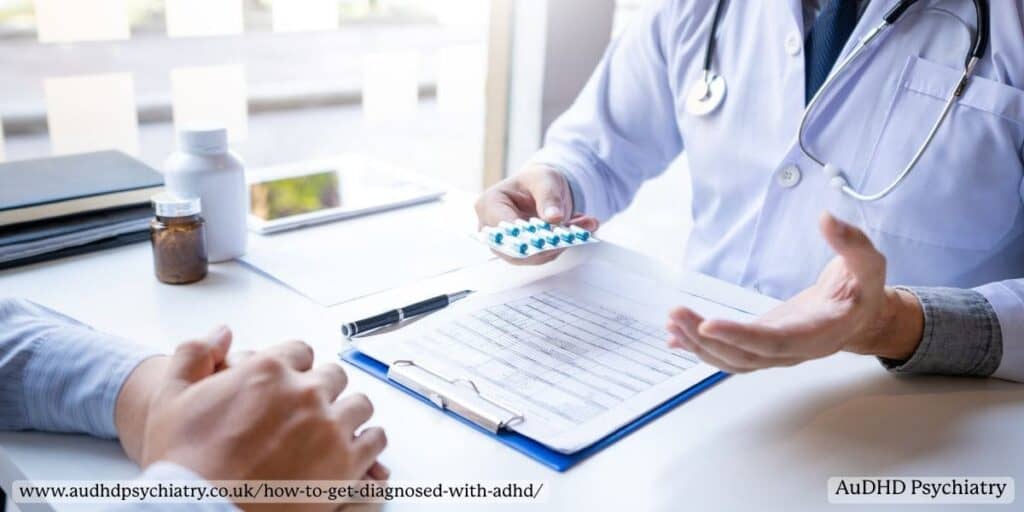
ADHD Medication in the UK: What to Expect
If you choose to explore ADHD medication, your prescriber will typically start with a low dose and monitor how you respond. It may take time to find the right type and dosage. Side effects can occur at first but often settle. Regular follow-ups are necessary so we can assess your progress and adjust your treatment where needed.
Whether you access treatment via the NHS or a private provider, medication must be prescribed and reviewed by a qualified medical professional. At AuDHD Psychiatry, we offer medication reviews and follow-ups with our ADHD specialists to ensure safety and effectiveness.
Accessing Support and Services
Beyond medication, you may benefit from practical tools and services such as:
- ADHD coaching or mentoring
- Support groups for adults, teens, or parents
- Occupational therapy (especially for younger children)
- Educational support and exam accommodations
A formal diagnosis opens doors to workplace adjustments, university support plans, or disability benefits, depending on how significantly ADHD impacts your life. You’re no longer navigating these challenges alone.
FAQs
1. How do you get diagnosed with ADHD as an adult if symptoms were missed in childhood?
Adult ADHD can still be diagnosed without a childhood diagnosis. Clinicians assess lifelong patterns using interviews, self-reports, and supporting evidence where available.
2. How to get diagnosed with ADHD as a woman when symptoms are mainly inattentive?
Women often experience inattentive ADHD or masking. Seeing a specialist experienced in adult female ADHD improves diagnostic accuracy.
3. What should you say to your GP to get an ADHD referral in the UK?
Focus on how symptoms affect daily functioning across work, relationships, and organisation, rather than listing traits alone.
4. How to get diagnosed with ADHD privately and still access ongoing treatment?
A private diagnosis can be followed by treatment planning, and in some cases, shared-care arrangements with your GP may be explored.
5. Can you get diagnosed with ADHD online in the UK, and is it valid?
Yes, online ADHD assessments are valid when conducted by qualified UK specialists using recognised diagnostic criteria.
How to Get Diagnosed with ADHD: Conclusion
Getting diagnosed with ADHD can transform your life. From recognising the symptoms to understanding your options through the NHS or a private provider, this guide has walked you through every stage of the process. A clear diagnosis can unlock access to personalised treatment, effective medication, and support at work, school, or home.
Whether you’re an adult who’s struggled for years or a parent concerned about your child, taking that first step matters. At AuDHD Psychiatry, we make the process simple, supportive, and fast. With no GP referral needed, flexible online appointments, and expert clinicians who specialise in ADHD across the lifespan, you’re in safe hands from day one.
If you’re ready to get answers and move forward with confidence, book your private ADHD assessment with us today. We’re here to guide you through every step of your journey, because clarity starts with the right support.
If you want to learn more about when to switch ADHD meds, check out our previous blog: When to Consider Switching ADHD Medications (or Adjusting Your Treatment).
You Might Also Like
Contact Us
We’re here to answer any questions you might have.
Get in Touch
Opening Hours
Contact Form
We’re here to help. Reach out and we’ll get back to you within 24 hours (Monday – Friday).

Leave a Reply